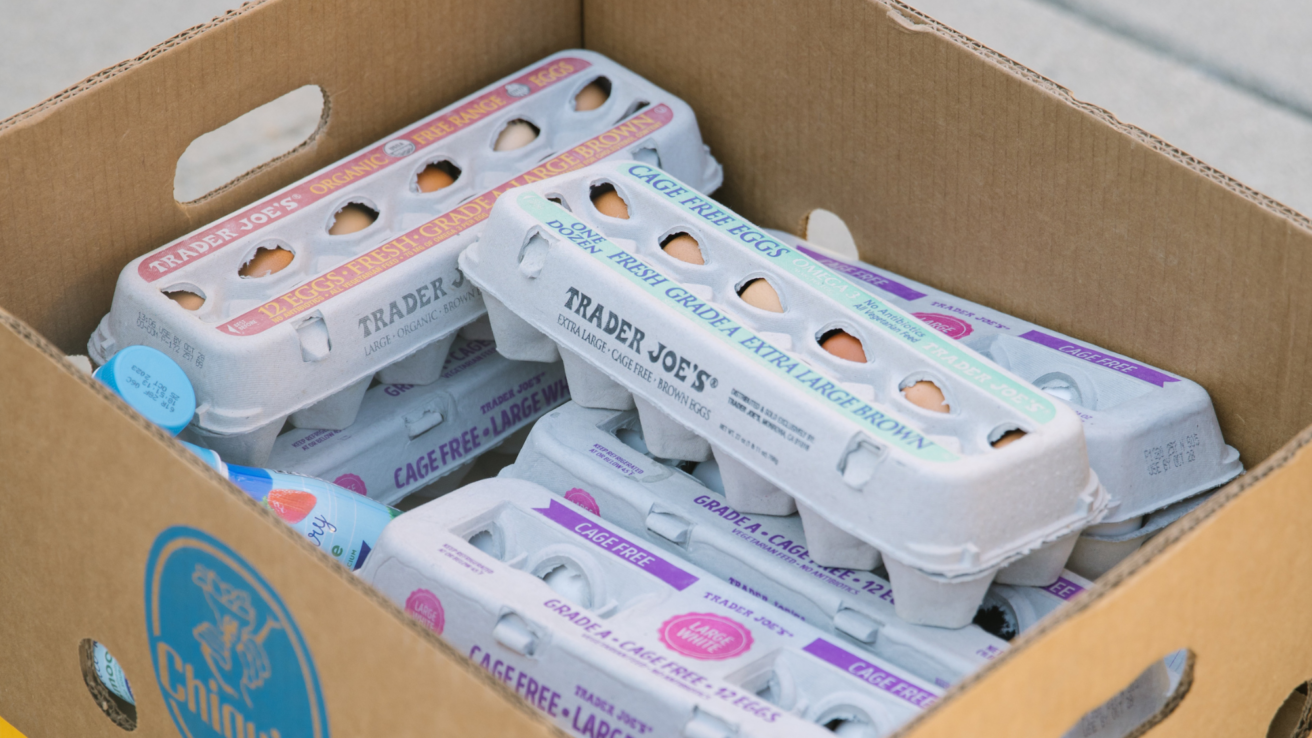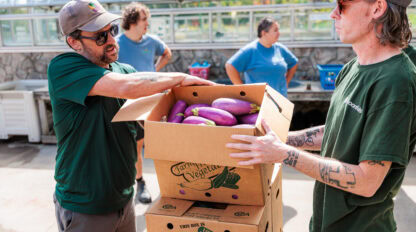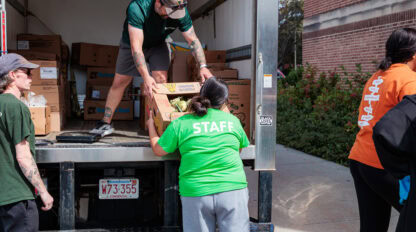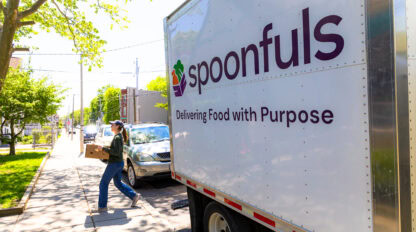Wasted food, hunger, and our government with State Representative Hannah Kane
December 14, 2023
Updated: May 21, 2025
We know wasted food creates a strain on our resources and our economy and reduces the amount of good food available to be used for its highest purpose: feeding people. While food recovery mitigates those impacts and helps ensure that good food lands on plates and tables and not in landfills, we know the right laws can help us further address these issues. Hannah Kane, a State Representative who represents the 11th Worcester District in Massachusetts’ House of Representatives, is one legislator pushing for such laws right here. Read on to learn more about what opportunities we have to fight wasted food and hunger in this interview with Rep. Kane.
Header Image: Rep. Kane (right) recently joined our team on the road to see our food recovery work in action. She’s pictured here with Lovin’ Spoonfuls’ Food Rescue Coordinator, Kim Vanacore (left), outside of Green Island Community Center in Worcester, where Spoonfuls delivers each week.
u003cstrongu003eWhat levers do you feel we ought to be leaning on to address the growing issue of food insecurity in Worcester County and beyond? Where have you seen success and what can we do to build on that?u003c/strongu003e
Partnerships between nonprofits, retailers, producers, government, people with lived experience, and other organizations are important to fighting food insecurity. Hunger is a multifaceted problem, and one group alone or one approach won’t be enough to end hunger in Worcester County or in Massachusetts. Being able to coordinate efforts and collaborate allows a wider variety of groups to contribute their knowledge, resources, and best practices, and that facilitates a broad approach that can address the multiple causes of hunger and reach more people. Building those partnerships is key to fully understanding the community’s needs and developing effective strategies for reducing hunger. Being cognizant of the drivers of food insecurity – such as lack of employment opportunities, transportation challenges, or illness – and working to fully address those issues is critical.
u003cstrongu003eCan you talk about wasted food legislation – your own and federal efforts? Why is this legislation important to you? What is needed to help it pass? u003c/strongu003e
My bill, H.2205, u003cemu003eAn Act decreasing food waste by standardizing the date labeling of foodu003c/emu003e, would standardize date labeling on food by establishing a quality date and a safety date. The quality date would indicate the date after which the quality of the food may have deteriorated, but it would still be safe to eat. The safety date would indicate the date after which consumption of certain high-risk foods may risk foodborne illness. Currently, there’s no distinction between the two, and some municipalities have bans on selling or donating food past its expiration date. [That leads to] people and retailers throwing out food that is otherwise fine, instead of consuming or donating it, because it has passed its expiration date. By differentiating between the two and allowing for the sale and donation of food that has passed its quality date but not the safety date, this bill will help reduce food waste and alleviate food insecurity.u003cbr/u003eu003cbr/u003eThe federal bills, H.R.3159 and S.1484, were filed by Representative Pingree and Senator Blumenthal respectively. They would also create two standard date labels: a safety date being called the “discard date” and a “quality date.” Food passed its quality date, but not its discard date, could be sold or donated. These bills, if passed, would reduce food waste across the entire country, rather than just in Massachusetts, and it would be a much better policy to standardize at the federal level, so manufacturers and others have one unified labeling standard to adhere to.u003cbr/u003eu003cbr/u003eMy bill, H.2205, was heard by the Joint Committee on Public Health in June, but it hasn’t moved out of the Committee yet. At this stage, it’s important for advocacy groups and the public to let their legislators know about the importance of this bill and encourage them to support it.
u003cstrongu003eWe also know that, in the words of Congressman Jim McGovern, “Hunger is a political condition.” You, like Congressman McGovern, have been known to work across the aisle to get things done in government. Where do you see opportunities for this in Massachusetts to address food insecurity and to reduce wasted food in particular?u003c/strongu003e
I totally agree with Congressman McGovern and deeply appreciate his leadership in our work to end hunger and pull people together to do so. He galvanizes people into action!u003cbr/u003eu003cbr/u003eThere are several bills pending that address food insecurity and food waste. In addition to H.2205, I sponsored H.1594, which provides civil liability protections for individuals, restaurants, and organizations that make direct food donations, and creates a tax credit for farmers who donate excess crops. H.2852, which I co-sponsored with Representative Howard, incentivizes small-scale urban agriculture that helps reduce hunger in cities and makes local food systems more resilient. The Food System Caucus, the second largest caucus in the legislature, has focused on these and other bills that reduce food insecurity, prevent food waste, and strengthen the local food system. The Healey-Driscoll Administration has also been supportive of universal free school meals and investments in the Commonwealth’s local food system through programs such as the Food Security Infrastructure Grant program. It’s important to have the legislature, executive branch, advocacy groups, and other stakeholders aligned as we work to end hunger in Massachusetts.
u003cstrongu003eWhat are you most excited about from the work of the White House National Strategy on Hunger, Nutrition, and Health?u003c/strongu003e
The most exciting piece for me is that there is a commitment by all of the interested parties in Massachusetts to work together – to break down silos and see separate initiatives as part of a broader and organized effort to end hunger by 2030. There are a number of promising initiatives in place thanks to the White House Conference on Hunger, Nutrition, and Health. The USDA’s Summer EBT (Electronic Benefit Transfer) program ensures that children who depend on free or reduced-price school meals continue to receive nutritious meals during the summer, while the non-congregate meal service reaches children in rural areas that do not have access to traditional summer meal programs. Existing programs, like SNAP (Supplemental Nutrition Assistance Program, formerly known as “food stamps”) and WIC (Women, Infants, and Children), have expanded outreach to reach more people who may be eligible for these benefits, and have put resources toward improving program delivery. For Massachusetts in particular, CMS (Centers for Medicare u0026amp; Medicaid Services) has also allowed MassHealth to expand nutrition services, including medically tailored meals, to food insecure populations and individuals with conditions that require special diets. It’s exciting to see the efforts being made across the country to end hunger, and I will continue to do all I can to support our work here in the Commonwealth.



